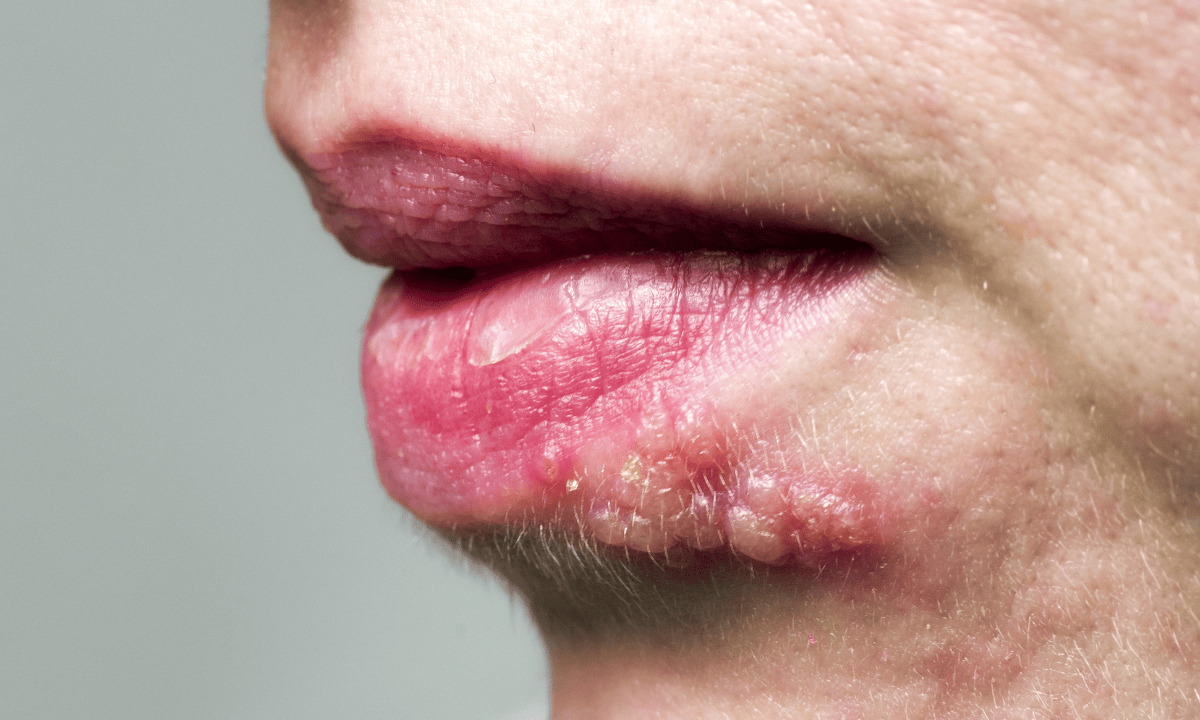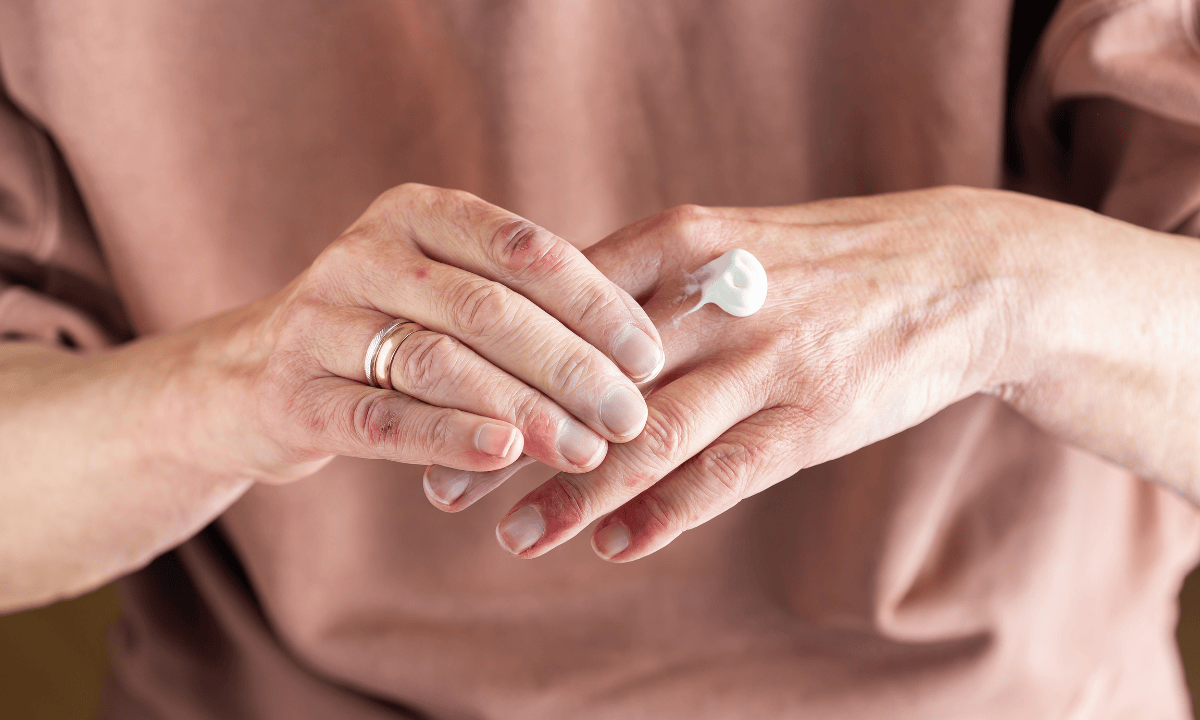Have you ever had itchy, tingly blisters on your lips or the skin around your mouth when you were sick or on your period? These could be cold sores, which are a common condition caused by the herpes simplex virus (HSV). Although they usually heal on their own, understanding the condition can help you manage it more effectively.
What is a cold sore?

A cold sore, also known as oral herpes, is a small, fluid-filled blister that usually appears around the lips but can also develop near the mouth, nose, or chin. These blisters often appear in groups, and after they burst, they leave a scab that can last for days.
Cold sores can be spread by direct contact with skin or saliva, like when you kiss someone or share utensils. While the virus is mostly spread through non-sexual contact, it can also be spread sexually, especially through oral intercourse.
Cold sore causes
Most cases of oral herpes are caused by herpes simplex virus type 1 (HSV-1). However, HSV-2, which is usually associated with genital herpes, can also cause cold sores around the mouth.
Some people are infected with the virus but don't know it because it stays dormant and doesn’t cause any symptoms. However, for others, certain triggers can cause the virus to be active again and cause cold sores to appear. These triggers include:
Fever
Stress
Fatigue
Sun exposure
Weakened immune system
Dental work or injury to the lips
Hormonal changes, such as during menstruation
Are cold sores contagious?
Oral herpes is highly contagious, so if you come into contact with a cold sore, you too can develop the infection. Where the infection appears on your body depends on which part touches the cold sore.
Cold sores are most contagious during the first 24 to 48 hours after the appearance of blisters, meaning the virus can easily spread through kissing, sharing utensils or other close contact. However, it's important to know that HSV can still be spread when there are no visible symptoms, although this is less common.
Cold sore symptoms
Although not everyone who has HSV will show symptoms, when they do occur, here's what you can expect:
Tingling, itching, or burning sensation on or around the lips
Redness and swelling in the affected area
Small, fluid-filled blisters that often appear in clusters on or near the lips
Pain or discomfort around the sore
These symptoms may vary depending on whether it is your first outbreak or a recurrence. The first time you have a cold sore, it is usually the most severe and may also cause:
Headache
Sore throat
Muscle aches
Swollen lymph nodes
Painful gums (especially in children)
When to see a doctor?
Cold sores generally heal on their own within two weeks. However, you should seek medical advice if:
You have a weakened immune system
The cold sores don't heal within two weeks
You experience severe pain or particularly large sores
The sores keep returning frequently
You develop gritty or painful eyes
If cold sores are affecting your daily life or you're concerned about frequent outbreaks, our specialists at Thomson Medical can help. Schedule a consultation with us for personalised care and support.
Our specialists who can treat cold sores
Loading...
How is oral herpes diagnosed?
To diagnose oral herpes, your doctor usually begins by examining the blisters and asking about your symptoms. They may ask how often you have outbreaks and if you've been in contact with someone who has HSV. To confirm the diagnosis, your doctor may also perform:
Blood test to detect HSV antibodies in your system
PCR (polymerase chain reaction) test to detect viral DNA from the sore sample
A viral culture test to see whether the herpes virus is present in the fluid taken from the sores
What are the available treatments for oral herpes?

Currently, there is no definitive cure for cold sores because the virus remains inside the body once contracted. However, this does not mean that treatment is ineffective; it can help reduce the duration and the severity of outbreaks. Treatment options for oral herpes include:
Antiviral medications:
Topical (cream) antiviral medication, such as aciclovir cream, can be applied directly to the cold sore and is available without prescription at pharmacies in Singapore.
However, if you have severe conditions or if topical treatments haven't been effective, your doctor may prescribe oral antiviral medications. Common oral antivirals include aciclovir, valaciclovir, and famciclovir tablets.
Pain relief:
Topical creams containing lidocaine or benzocaine can help numb the pain
Oral pain relievers such as ibuprofen or paracetamol
To help provide comfort and support healing, there are a few home care remedies that you can try:
Keep the area clean and dry
Apply ice or a cold compress to reduce swelling and pain
Use lip balms with SPF to protect against sun exposure (a common trigger)
Avoid picking or touching the sore, which can delay healing and spread the virus
Wash your hands frequently, especially after touching the affected area
To help you manage cold sores, schedule a consultation with Thomson Medical. Our specialists can assist you in determining the best treatment option for your specific needs.
Can cold sores be prevented?
Although oral herpes cannot be fully cured, there are steps you can take to prevent spreading or catching this condition.
If you have cold sores, protect others by:
Avoiding kissing and close physical contact
Not sharing cups, cutlery, towels, or toothbrushes
Washing your hands often, especially after you touch the area that is affected
Covering the cold sore whenever you can
If you've had a cold sore:
Use lip balm with SPF to protect against sun exposure
Use relaxation techniques or regular exercise to deal with stress
Get adequate sleep and maintain a healthy immune system
Find out what triggers you (like stress or being in the sun) and stay away from them
FAQ
Are cold sores contagious?
Yes, oral herpes is contagious, especially when blisters are present, though the virus can still spread even when no sores are visible. To reduce the risk of transmission, avoid:
Kissing or close face-to-face contact
Sharing drinks, utensils, or cosmetics
Oral intercourse (the virus can spread to the genitals and cause genital herpes)
How do you quickly get rid of a cold sore?
To speed up the healing process, try the following:
Start treatment early, ideally when you feel a tingle, before blisters appear
Apply antiviral cream or take oral antiviral medication within the first 24-48 hours
Keep the area clean and avoid touching the sore
Apply ice or a cold compress to reduce swelling
Is oral herpes a sexually transmitted infection (STI)?
Oral herpes (HSV-1) is not usually considered an STI because most people contract it through non-sexual contact, such as kissing or sharing utensils. However, HSV-1 can be sexually transmitted through oral intercourse, which can result in genital herpes. So, while it is not usually considered an STI, sexual transmission is possible.
Can I still kiss someone if I have oral herpes?
It's best to avoid kissing if you have an active sore or can feel the symptoms of an outbreak starting, such as tingling or burning. The risk of transmission is highest at this time. Between outbreaks, when you have no symptoms, the risk is much lower, though not zero.
If you're worried about passing the virus on to your partner, talk to your doctor about taking suppressive antiviral therapy to reduce the risk.
How long does a cold sore last?
Typically, a cold sore lasts from the first tingling sensation to full healing for 7 to 10 days. However, an initial outbreak may last up to two weeks.
Would it be possible to get cold sores on the tongue?
Yes, although they are less common than cold sores on the lips. HSV-1 can cause blisters or ulcers on your tongue, gums, inner cheeks, or throat, especially during your first outbreak. This condition is called herpetic gingivostomatitis and is more common in children. The symptoms include painful mouth ulcers, a fever, swollen gums, and difficulty eating or drinking.
The information provided is intended for general guidance only and should not be considered medical advice. For personalised recommendations based on your specific conditions or needs, schedule a consultation with our specialists at Thomson Medical.
For more information, contact us:
Thomson Specialists (Women's Health)
Thomson Women's Clinic (TWC)
- Novena:
6592 6686 (Call), 8611 8986 (WA) - Bukit Batok:
6569 0668 (Call), 8686 3525 (WA) - Choa Chu Kang:
6893 1227 (Call), 8282 1796 (WA) Jurong:
6262 8588 (Call), 6262 8588 (WA)- Katong (female doctor):
6970 2272 (Call), 8611 9020 (WA) - Punggol:
6243 6843 (Call), 8811 0328 (WA) - Sembawang: 6753 5228
- Sengkang: 6388 8125
- Serangoon (female doctor): 6382 3313
- Tampines: 6857 6266
- Tiong Bahru: 6276 1525
